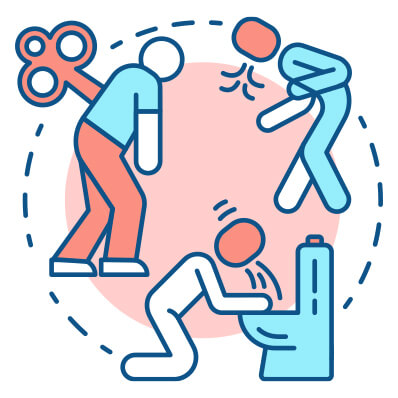The keto flu is a common but avoidable side effect of transitioning into ketosis. Learn more about its causes, symptoms, and remedies here.
If you are starting the keto diet, it means you are cutting carb intake down to around 25 grams of net carbs or fewer a day, and you are bulking up on fats, to make them about 80 percent of the diet. And of course, this is HARD work. It puts your body through a major transition, especially if your diet has mostly consisted of carbs and sugar foods, rather than high-fat options and protein.
So, since you are going through a transition, you might experience keto flu while doing so. What is the keto flu? It’s the phase as your body adjusts, and it can come with a slew of symptoms of keto flu, like dehydration, keto headache, nausea and vomiting, joint pain, constipation, fatigue, cravings, irritability, irregular sleep, and more.
Does everyone get the keto flu? Yes, but some get it more extreme than others, as well as for longer than others.
For instance, you can take some action steps to mitigate symptoms and treat it better. Either way the shift will provide some sort of side effects that are different than what you have been used to.
Overall, those workouts will be harder to do and you might just not feel like yourself. You’ll feel lethargic and weaker, but as long as you stick with it, you will get through it and start to reap the rewards of the keto lifestyle – keto flu free!
What Is the Keto Flu?
The low carb flu is not fun – it can take anywhere from 4 to 21 days, depending on the person, management steps to avoid the keto flu or reduce symptoms, and how often it is occurring. The first time will be the longest and hardest, most likely. From there, if you get kicked out of ketosis, like let’s say you go on a vacation, you may exhibit symptoms of low carb flu again, but in a less extreme way and with a shorter duration to get back into the swing of things.
When does keto flu start? The keto flu happens as you begin the keto diet and adjust to this new style of eating and it can pop up again if you fall out of ketosis for a couple of days or a period of time 1. It comes with the transition, as your body starts to run off of fat, and burns fat, as opposed to glucose, which is found in carbs.
Keto Flu Symptoms

Feeling tired and sick are common keto flu symptoms.
What are symptoms of ketosis flu? If you are on keto and experience symptoms, you might have:
- Dehydration and excess thirst
- Nausea and vomiting
- Joint pain and muscle soreness
- Fatigue and weakened state
- Brain fog and less focus
- Sore throat
- Cravings and irregular appetite
- Irregular sleep
- Runny nose and “cold like” symptoms
How Is the Keto Flu Treated?
Unfortunately, you need to let it run its course. Yet, you can shorten duration and alleviate side effects by taking certain measures.
Drink enough water to stay hydrated
By drinking fluids you can combat thirst and dehydration and boost electrolytes, to keep the body balanced. Electrolytes can help provide energy and to keep you more awake and focused. In addition to drinking water, you can eat electrolyte packed foods, like leafy greens, too, which can help, and you can pop electrolytes supplements or put into a smoothie.
Consume enough fat in the diet
By bulking up on fats, you are increasing ketone production to help your body stay in ketosis and to thrive on the diet and how it should run. Plus, fats will help keep your body satiated and provide nourishment. Add in good fats like avocado, nuts and seeds, nut butter, fatty fish like salmon and olive oil or MCT oil. You can also eat protein in moderation – look to grass-fed steak, chicken, and eggs. Consider adding in extra fatty boosters, like MCT oil or coconut oil, into coffee or smoothies to get extra ketones 2.
Avoid strenuous exercise
Your body is tired right now and fighting off keto flu symptoms, so now is the time to hold off on the HIIT and cycling classes and opt for slow movement, like meditation and light yoga, instead. When the time comes for the keto flu to pass, you can resume other intense workouts with more strength and vigor!

Get enough sleep
During this time, you might have more cravings, feel tired throughout the day, and have irregular hormones and sleeping patterns, as your body is out of whack. Yet, make sure to prioritize sleep since it will help your body fight the effects and recuperate at night. Plus, it is good for fighting joint pain and muscle soreness, since nighttime sleep hours helps with muscle recovery. Aim for 7- hours nightly.
Does Everyone Get Keto Flu?
Yes, everyone will, but the intensity of ketosis flu symptoms and duration is individualized and can differ. Provide relief for yourself based on how your own body is doing – do not think one person’s experience will be the exact same as yours. And if you need help, reach out to a dietitian or professional for tips on easing the transition too.
How Long Does Keto Flu Last?
It will last between 4 and 21 days – sometimes it is shorter or longer, based on what you are doing to help manage it. If you are really good with following the keto diet from the start and are taking the right supplements, eating the right foods, and resting your body, you will likely pass through faster and with more ease than someone who is struggling to ditch those carbs, bulk up those fats, and give themselves time to heal and get through it.
When Should I See My Doctor?
If any of your symptoms are worrisome, then you should definitely call or see a doctor for help. If your nausea and vomiting is extreme and chronic for instance, ask for assistance. Use your best judgment. If you are simply a bit more tired than usual, keep up with it to see if it passes and to then see how you feel. Yet, if you are going to have a couple days of intense symptoms and pain, perhaps this diet is not right for you.
Takeaways
- The keto diet has a variety of benefits, like fat burning, greater cognition, and fewer cravings, yet this keto flu transition can be a doozy. Instead of letting it get you down, be prepared for what to expect and have a buddy or support system so you do not go through it alone.
- Whether it is someone who has done it before, someone doing it with you now, or just a person to lean on to keep you motivated and comfortable, find an outlet for relief. And follow the rules of the diet and take any necessary aids that can help you mitigate symptoms. It is just temporary!










![Juicing for Weight Loss: Everything You Need to Know [Plus Recipes]](/wp-content/uploads/2019/08/Juicing-for-Weight-featured-image.jpg)








